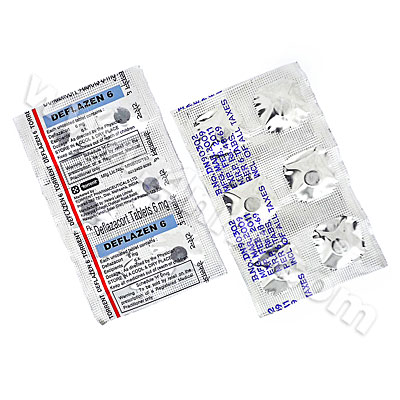 |
Home  General Health General Health  Deflazen (Deflazacort) Deflazen (Deflazacort) |
|
|||||||||
|
Deflazen (Deflazacort)
What is Deflazen (Deflazacort) used for? Deflazen (Deflazacort) is a type of corticosteroid which is used to reduce inflammation occurring as a result of various conditions, such as asthma, lung inflammation, severe allergic reactions or arthritis. It can also decrease the amount of white blood cells in the blood, which can help to prevent organ transplants from being rejected. Apart from these uses, it is used to treat autoimmune diseases. How should I use Deflazen (Deflazacort)? Deflazen (Deflazacort) tablets should be taken orally. The exact dosage required for each patient may vary, depending on the condition being treated. Patients should never abruptly discontinue taking this medication if they have been taking it for more than 3 weeks. Instead, you should consult your physician, who will gradually reduce your dosage. Never exceed the prescribed dosage. What are the side effects of Deflazen (Deflazacort)? Patients may notice some side effects when taking Deflazen (Deflazacort), such as:
Other side effects include muscular weakness, changes in mood, Cushing's syndrome, fluid retention or high blood pressure. You should discuss the risks of all possible side effects with your physician before taking this medication. Please Note Strictly follow all instructions provided to you by your physician or pharmacist while using Deflazen (Deflazacort). Optimum and safe dosage can differ based on the patient and the condition being treated. As this medication may be unsafe for certain patients, it is essential you always inform your physician if you are pregnant or breastfeeding, as well as if you have any allergies, other illnesses, or ongoing health conditions, and if you are taking any other form of medication, supplements, or herbal products. Patients using this medication should carry an ID card or wear a bracelet which clearly states that they are using corticosteroid medication. Immediately seek emergency medical care if you have any allergic or hypersensitive reaction. Common signs of a reaction include hives, swelling, skin rashes, chest pains, as well as trouble breathing or swallowing. 
|
|||||||||||||||||